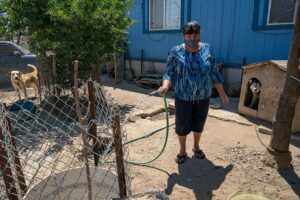California had a plan to bring clean water to a million people. Then the pandemic hit

CANTUA CREEK, Fresno County — The water is too contaminated to safely drink, but residents of this farmworker community in the Central Valley pay $74 a month just to be able to turn on the tap at home.
Their bills are even higher if they use more than 50 gallons a day, a fraction of daily water consumption for the average California household. And when Fresno County completes a new well that has been planned for years, the price will increase again to cover the cost of treating manganese-laced water pumped from hundreds of feet below.
It’s a lot of money for families living on the minimum wage they earn in the nearby fields, so local leaders hoped to get help from a state fund created last year to address a crisis that has left the 275 residents of Cantua Creek and a million other Californians without clean water. Then the coronavirus pandemic hit, throwing the finances of the program into question right as it started.
The situation underscores just how difficult it will be for the state to reach its goal of bringing safe and affordable drinking water to all. At a meeting this month where the State Water Resources Control Board adopted its first spending plan for what was supposed to be a $130 million-a-year investment for the next decade, Chairman Joaquin Esquivel acknowledged that the economic downturn could set California back.
“The number of systems we can assume will be out of compliance, we’re really concerned that that’s even more, exponentially growing,” Esquivel said. “And the resources aren’t necessarily there, growing with it.”
For the residents of Cantua Creek who have fought the hardest to fix their polluted water, it can feel as though they are the butt of a cruel bureaucratic joke — a community of workers growing the fruits and vegetables to feed a state that can’t supply them with clean water.
“It’s humiliating what they do to us,” Julia Mendoza, 50, who has traveled to Sacramento numerous times to lobby legislators and regulators for the new fund, said in Spanish. “We’re asking for the same right that everybody has: clean water.” Read more >>>